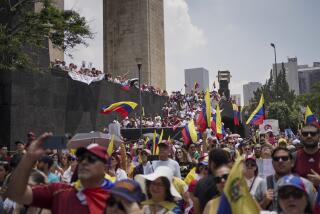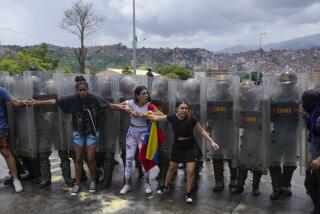War Shadows Campaigning in Nicaragua : Elections: Voter registration in rural areas has surged along with rebel activity. But both sides fear attack.
- Share via
RIO BLANCO, Nicaragua — Since the start of Nicaragua’s election campaign 10 weeks ago, the Contras have augmented their forces around this frontier town, telling peasant farmers to vote against the Sandinista government and stepping up armed attacks.
The quickening rebel activity has contributed to an overwhelming turnout for voter registration here, especially in rural hamlets where anti-Sandinista sentiment runs high. But civilian opposition leaders complain that it has exposed them to charges by the government that they support violence and brought down restrictions on peaceful politicking.
Recent events around Rio Blanco offer a case study, in one rural area, of how war is shadowing politics as Nicaragua struggles toward an election that is aimed at stopping the bloodshed. It is a place where, after eight years of fighting, much of the stumping is conducted by armed brigades.
“The outlook for the election is not so clear,” said Father Domingo Pepe, a Roman Catholic priest in Rio Blanco. “What dominates most here is fear.”
On Oct. 21, 18 Sandinista soldiers being trucked to register to vote died in an ambush that, by all accounts, was set by the Contras. Six other soldiers and civilians have been killed near the town in rebel attacks since formal campaigning opened Aug. 25.
Citing the ambush and growing rebel infiltration from Honduras, President Daniel Ortega ended a 19-month cease-fire throughout Nicaragua on Nov. 1. As the Sandinista army readied troops, helicopters and artillery for a major offensive, the Interior Ministry reported killing 14 rebels in an ambush last Thursday near here.
The Sandinistas have also mounted a political offensive here to link the 14-party National Opposition Union (UNO) to the Contra ambush.
Rock-throwing Sandinista gangs, called turbas, have attacked opposition rallies in the war-zone towns of Jalapa, Matagalpa and Pantasma in the last 10 days.
Here in Rio Blanco, an angry crowd of ruling party supporters, some of them armed, gathered outside the homes of local opposition leaders two days after the Contra ambush, demanding that they clarify their ties to the U.S.-backed insurgency or condemn it.
In official statements, UNO has tried to cast doubt on the government’s version of the ambush. It has issued statements here and in Managua denying any coordination with the rebels and rejecting all acts of violence.
In interviews, however, local activists admit they know that the Contras staged the attack but are afraid to say so publicly. They concede that rebel violence has bloodied the group’s image and prompted defections by some of their campaign workers, but they feel powerless to stop it.
“This situation is very threatening,” said Crisanto Sosa, who was a lieutenant in former dictator Anastasio Somoza’s National Guard and is now president of UNO’s local branch. “If we denounce the Contras, at a certain point they could grab us and kill us. We cannot compromise ourselves.”
Sosa spoke to reporters Saturday in a hotel he owns while hundreds of Sandinista supporters gathered a block away in the town square for a speech by Ortega, who is seeking reelection. The politician said the group had been ordered by security officials to halt local campaigning the week of Ortega’s visit.
As the idled opposition leader returned to his card game in the hotel courtyard, the crowd in the plaza chanted: “UNO, the Contras and Somoza--they’re all la misma cosa (the same thing)!”
Rio Blanco, a major trading post at the edge of the central highlands, is as polarized as any Nicaraguan town. While the revolution has brought land, schooling and better medical care to many of its people, hundreds of others have taken up arms to protest food rationing, collective farming, obligatory military service and police repression.
Last July 19, when the Sandinistas marked 10 years in power, Rio Blanco marked an entire year without a Contra ambush. But even during the truce, small conflicts simmered and Sandinista agents moved ruthlessly against the rebels’ network of civilian supports.
The election campaign has brought these tensions back to the surface. Chants of “ Viva el FDN! “ -- a salute to the Contra army--erupted at a rally here in August. A wall slogan in town condemns Violeta Barrios de Chamorro, the UNO presidential candidate: “Violeta Dies, the Revolution Stays.”
Sandinista officials estimate that 200 Contras have filtered back from Honduras since August to double the rebel presence in the hills around Rio Blanco.
“They’re coming in with two to three new uniforms (apiece), as if to show their support from the United States is as strong as ever,” said Pedro Haslam, the top Sandinista official here. “Their message is: ‘Vote for the UNO or the war will continue.’ ”
Election officials said 16,637 people signed up during the voter registration period in October--more than four times the number who did so in 1984, when the Sandinistas faced weak opposition. So heavy was the crush in some rural precincts this time that two small children standing in line with their mothers died of suffocation.
“There was too much enthusiasm,” said a Sandinista supporter. “They stood in line all night. They want to change the government.”
Opposition leaders charged that 25% of the eligible voters who tried to register were turned away--in some cases by the army, in others by election officials who had run out of registration cards.
On the other side, Sandinista officials said the rebels intimidated peasants by claiming to have a “special machine” to determine how each person votes.
“Holding an election here in Rio Blanco, with civic guarantees and all, is going to be very difficult,” Haslam said. “This is a territory of conflict and the clearest conflict here is between the Sandinista army and the Contras. . . . To the Contras, it’s not a question of which side has the best program. It’s a question of military might. . . . The UNO is secondary.”
Sandinista officials said Ortega’s decision to end the cease-fire was aimed in part at neutralizing the Contras’ role in the election and blaming UNO for the violence.
In a recent meeting with UNO leaders, Haslam demanded that they explain an encounter they had in September with a rebel chieftain and a communique signed by Enrique Bermudez, the senior rebel commander, instructing his troops to serve as “guarantors” of an opposition election victory.
“We have a coincidence of political ideology with the Contras, but we do not have joint plans,” said Vicente Juarez, a local leader. He said that if he had any influence, “I would say to the Contras: ‘Act only in self-defense and don’t attack.’ If the war increases, it will only favor the Sandinistas.”
In interviews, farmers and townspeople say they are concerned less about which side is reviving the war than how they are going to cope with it.
“We are living through tremendous anxiety. Everybody is frightened and afflicted, waiting for a great war,” said Yelva Guzman, 54, who sells hot meals and medicine from her farmhouse outside town. “We are afraid of both sides because both have arms. People die on one side and the other because the arms are all the same, the soldiers are all the same.”
More to Read
Sign up for Essential California
The most important California stories and recommendations in your inbox every morning.
You may occasionally receive promotional content from the Los Angeles Times.













